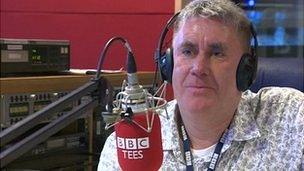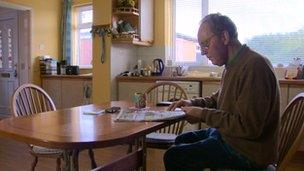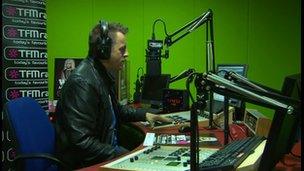North MPs angry at BBC plan to cut local radio and TV
- Published
- comments

The BBC says breakfast programmes like Ali Brownlee's will be protected but trade unions say the cuts will affect them
Stories about cuts have been plentiful in the last year, but this week I've had to deal with some that are happening very close to home - in the BBC.
The corporation is under financial pressure because as well as the licence fee being frozen for five years, it will also now have to fund the World Service and the Welsh language TV channel S4C.
The BBC says it needs to save 20% of its budget, although around a fifth of that cut will be reinvested.
And local and regional services here will certainly be affected by that process.
Radio cuts
Under the BBC's proposals around 33 jobs are expected to go - that's 15% of the workforce in the North East and Cumbria.
Local radio will shed the bulk of those.
BBC Tees, Newcastle and Radio Cumbria are having to lose around 13% of their budgets, but that equates to around 20% of day-to-day costs as there are many fixed bills for buildings and other services that can't be trimmed.
The BBC One current affairs programme Inside Out will lose 40% of its funding the equivalent of around half its staff.
And there will be cuts to the weather presentation in the region, as three full-time forecasters are reduced to one.
Now all these changes are potentially very painful for many of my colleagues, but of course had there just been internal dissatisfaction at these proposals, the Politics Show would not have been interested.
Instead, it is the concern they have caused amongst MPs, councillors and some listeners and viewers that have made us decide to cover the issue.

The investigative programme Inside Out stands to lose 40% of its budget in the cuts
Around a dozen MPs from Cumbria and the North East turned up at a Commons debate on the local radio cutbacks, external a few weeks ago. Conservative, Lib Dem and Labour MPs have protested to the Director General about the proposals.
This week the Newcastle Central MP Chi Onwurah, external also called her own Westminster debate, external to register her opposition to cuts.
Sharing programmes
The BBC though insists that the local and regional audience will still get a good service.
In local radio, it's proposing sharing afternoon programmes between regions. Evening and some weekend output could also be shared across England.
It says the cuts will protect the programmes that most people listen to.
Phil Roberts, Head of Centre in the North East and Cumbria, said: "We've got less money, and so what we are doing is thinking about where that money should go so that listeners do not suffer.
"So breakfast, mid morning, drivetime and sport is where approximately 86% of the audience spend their time. If we can protect that side of the business, that is more important than spending money in off peak times such as afternoons."
But the trade unions in the BBC say that's misleading.
They argue that the budget cuts will lead to a poorer service throughout the day, as up to 10 jobs could go at each of the region's local radio stations..
National Bectu organiser Mark Scrimshaw said: "Sharing programmes in the afternoon would lead to perhaps two jobs going per station, but they are taking out far more than that, so where are they coming from?
"They have got to come from the other programmes, there is nowhere else for them to come from so of course they will be affected. It is simple mathematics I'm afraid."
Retrograde step
Some listeners aren't convinced either. Brian Davies from Norton has listened to BBC Tees for 40 years.
Since he lost his wife, he says it's been a lifeline. He is opposed to sharing programmes.
He said: "It is a retrograde step. Years ago, they used the share programmes and it didn't work. It was not local radio anymore.

BBC Tees listener Brian Davies believes sharing programmes regionally and nationally would short-change the community
"You got programmes from Manchester, Leeds and Newcastle and it just lost its identity. I think listeners would be short-changed."
But what might well have rattled the BBC is the scale of the opposition from MPs and councils.
Many in the region have criticised the local radio cuts.
They are also worried that proposals for Inside Out will rob the region of the kind of investigative journalism the programme specialises in.
The BBC says there will still be a team of journalists working on investigations in Newcastle, and that the Inside Out programme will continue.
But it will have to perform the task with less money and fewer staff, with some material likely to be pooled across northern regions.
Investigative journalism
That issue was raised by Chi Onwurah during her Commons debate.
She said: "it is very important that investigative journalism has the scale and presence locally to be able to identify issues of great significance to local people's lives, such as Southern Cross.
"Therefore, the cuts to investigative journalism in the north-east are particularly worrying.
"Inside Out is the last remaining dedicated in-depth regional programme on British TV, and the North East and Cumbria edition has won Royal Television Society awards for the last six years running. However, it faces cuts that will see it lose 40%."
So there's plenty of concern, but some will ask whether what the BBC's being asked to do is really that unusual in a climate where lots of public and private sector organisations have had to save money and adapt.
During the same debate Culture Minister Ed Vaizey, external said: "Everyone is having to make savings, and when families up and down the country are trying to manage their budgets, this is not the right time to substantially increase the BBC licence fee.
"What the BBC does have, which no other media company in this country really has… is certainty over its funding until March 2017."
Staying local
That's certainly something commercial radio would love to have.

Commercial stations such as TFM have managed to come through their own tough times
Many stations have struggled in recent years because of falling advertising revenue.
But by adapting to different circumstances, some have survived and are even aiming to improve what's on offer.
TFM, external in Teesside is one station that's tried to make sure it stays as local as possible.
Managing Director Cath Ellington said: "I think we have held our nerve. We have got a clear strategy that is all about being local.
"It would have been wrong for us to consolidate or go down the network route because that is not what we are about. And because we have held our nerve that has enabled us to sustain and grow audiences."
The BBC is also convinced it can still serve local audiences well even after the cuts. It is though still seeking views via a consultation, external that finishes at the end of the year.
The Politics Show will be debating whether they're right, and whether the government needs to share the blame for the cuts at 12pm on Sunday 27 November on BBC One.